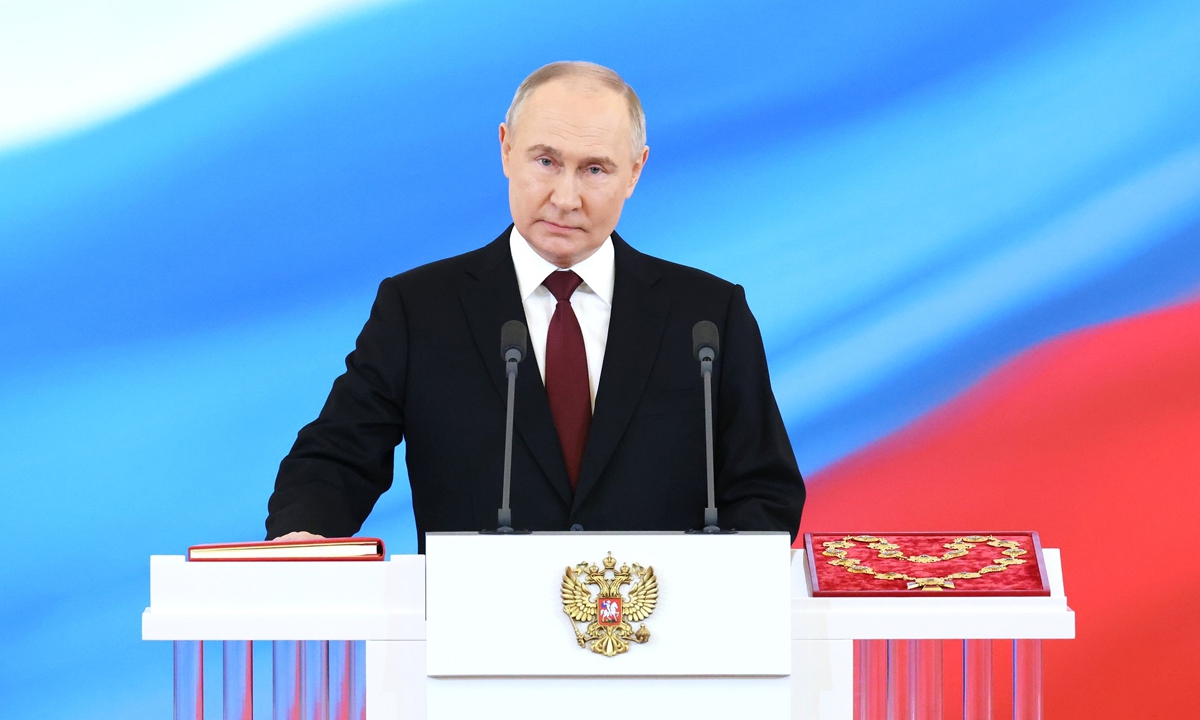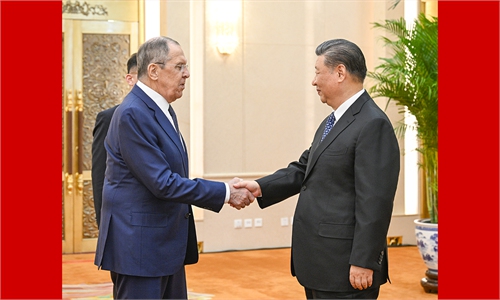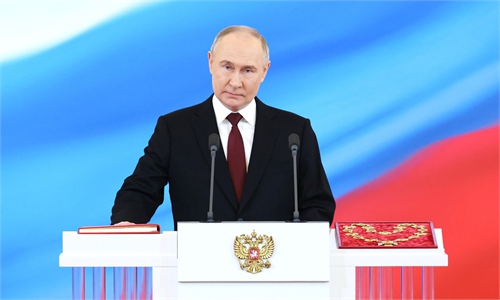Putin to pay state visit to China, ‘bilateral strategic ties to be further improved’

Vladimir Putin formally takes office as Russian President for another six-year term on May 7, 2024. Putin assured in his inauguration speech that the interests and security of the people of Russia will be above all else for him. Photo: VCG
At the invitation of Chinese President Xi Jinping, Russian President Vladimir Putin will pay a state visit to China from May 16 to 17, the Chinese Foreign Ministry announced on Tuesday, with analysts from the two countries saying that the visit will have strategic significance for not only the two major powers, but also the world amid turbulence and profound changes.
This is Putin's first state visit after he was sworn in as Russian president for a new term, Wang Wenbin, a foreign ministry spokesperson, told a regular press briefing.
As this year marks the 75th anniversary of the establishment of diplomatic relations between China and Russia, during the visit, Xi and Putin will exchange views on bilateral relations, cooperation in various fields, and international and regional issues of common concern, Wang said.
He added that China will release relevant information on this visit in a timely manner.
Chinese experts said that Putin's decision to choose China as the destination of his first state visit after his reelection is not a surprise, and this shows that Moscow attaches great importance to further developing its strategic partnership with China, and that under pressure from the West, Russia's determination to "turn to the East" is becoming rock-solid.
Bilateral ties
Zhang Hanhui, Chinese ambassador to Russia, told the Global Times in an exclusive interview recently that "under the strategic guidance of the two heads of state, the comprehensive strategic partnership of coordination for a new era between China and Russia is currently in its best historical period."
Cui Heng, a scholar from the Shanghai-based China National Institute for SCO International Exchange and Judicial Cooperation, told the Global Times on Tuesday that the world will pay attention to the meeting between the top leaders of the two countries to see how China-Russia relations can be promoted to a new height, as strategic ties between the two major powers will greatly affect the international arena.
Yang Jin, an associate research fellow at the Institute of Russian, Eastern European and Central Asian Studies at the Chinese Academy of Social Sciences, told the Global Times on Tuesday that during his trip to China, Putin could also visit some places outside Beijing, and that would be key to watching where Russia's specific interests lie in its cooperation with China.
Analysts said the two countries are expected to promote cooperation in many fields, including energy, aerospace, chemical engineering, education, transportation, infrastructure construction, agriculture and media, as the two countries are greatly interdependent and complementary.
Alexey Maslov, director of the Institute of Asian and African Studies of Moscow State University, told the Global Times that "We value the stability of Russia-China relations. The one word I can use to describe our relationship is 'trust.' That's very important because if you look at the cooperation with the Western countries, we don't have, and we have never had, mutual trust. But with China, we have a mutual trust."
"Our cooperation during the last two years developed very fast," said Maslov, adding that the two countries could deepen cooperation in finance and banking, as well as in sci-tech and investment.
The long-arm jurisdiction imposed by the US in the past two years has brought some impacts and added barriers for normal economic and trade relations between China and Russia, and in the next step, the two sides will try to find solutions to handle the problem, said some observers.
Multipolar world
China and Russia are both major powers and permanent members of the UN Security Council, and they share a consensus to promote a multipolar world order. Therefore, in many international issues, the two countries will strengthen their coordination to jointly safeguard world peace and justice among the international community, experts said.
"Taking the 75th anniversary of diplomatic relations as an opportunity, China and Russia will further strengthen strategic cooperation, cultivate new momentum for cooperation, and help each other achieve development and revitalization. The two countries will also continue to enhance international multilateral cooperation, practice true multilateralism, and make contributions to the security and stability of both countries, regions, and the world," Zhang said.
Russian philosopher and political analyst Aleksandr Dugin told the Global Times that China and Russia are two "pillars" of the multipolar world, and the cooperation and communication between the two pillars will encourage many other countries worldwide to also participate in the construction of a new multipolar international order with confidence.
The 2024 BRICS Summit will be held in Russia from October 22 to 24, marking the first summit since the expansion of the bloc. And this year, China is the rotating chair of the Shanghai Cooperation Organization (SCO). Analysts said that China and Russia will jointly strengthen coordination in different multilateral mechanisms to make the Global South play a more important role in global governance.
Global & regional issues
The Russia-Ukraine conflict has lasted for more than two years with serious casualties and heavy economic losses. As the US will have presidential elections at the end of the year, some observers believe it could be a chance for different parties to bring this crisis to an end.
China has always made efforts to promote peace talks and mediate the conflict between different parties, and in order to realize a cease-fire and stop the bloodshed, it is necessary for the top leaders of China and Russia to maintain communication, so that China can bridge the different parties that have contradictory stances, said experts.
Zhang said "In regard to the Ukraine crisis, China has always adhered to an objective and just position, always standing on the side of peace and dialogue, actively advocating for peace and promoting talks."
Unfortunately, there is still no sign of a cease-fire in the current crisis, and the conflict is still escalating and expanding, Zhang noted. The parties involved are not willing to budge on their positions, with significant differences in understanding. Some external forces are still adding fuel to the fire and fanning the flames, he said.
"History has proven that the end point of any conflict is the negotiating table. China supports the timely convening of an international conference recognized by both Russia and Ukraine, with equal participation of all parties and fair discussion of all peace proposals. China is willing to continue to play its unique role and contribute Chinese wisdom and strength to promote a political solution to the Ukraine crisis," said the ambassador.
Li Haidong, a professor at the China Foreign Affairs University, told the Global Times on Tuesday that not only on the Ukraine crisis, the two sides may also coordinate their stances on hot spot issues such as the Palestinian-Israeli conflict, to speak for justice and stand with the Global South to oppose unilateralism and hegemony together.



